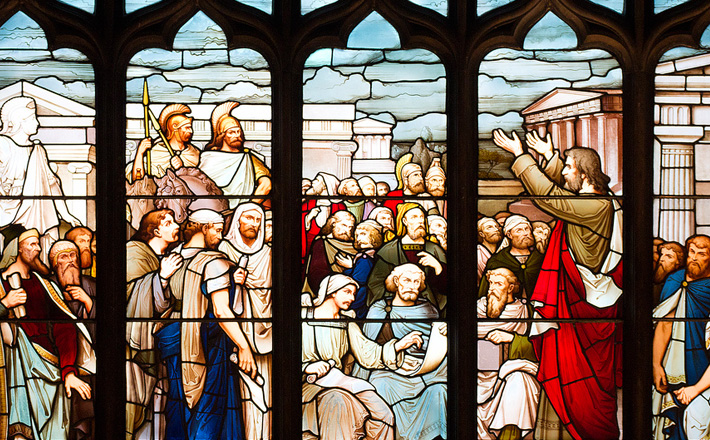Commentary on Psalm 66:8-20
God makes the whole world shout “Hooray!”
It’s just this sort of shout, hari‘u, that begins Psalm 66. Hari‘u is an imperative verb meaning: “(Hey, all of you) make some noise! Shout!”
The verb appears in a number of contexts, with the most common being celebrations (Isaiah 44:23; Zephaniah 3:14) and descriptions of conflict and victory, where it is often translated “raise a war cry” (Joshua 6:10, 16, 20; 1 Samuel 17:20, 52). In Psalm 66, this gigantic “hooray!” from the whole earth (verse 1) expresses joy to be sure, as many translations have suggested: “Make a joyful noise” (NRSV); “Shout joyfully” (CEB). Yet the verb also signals that everyone and everything should participate in God’s victory. The psalm suggests that God has won and God is winning throughout the whole world.
The opening shout of hooray (verse 1) initiates a string of imperative verbs, “sing … give praise … say” (verses 2-3). “All the earth” experiences God’s victorious power and responds to it with exultation (verses 2, 4). In fact, the power of God is evident to everyone. While enemies “cringe” (verse 3) before a victorious God, faithful communities rejoice as they bear witness to God’s saving acts throughout history.
A narrowing focus on God’s actions
As the psalm progresses, its focus narrows. The psalm begins with a summons for the whole world to praise God (verses 1-4). Yet the psalm soon shifts to describe God’s interactions with a particular people (verses 5-12) and ends with a meditation on God’s relationship with a particular person (verses 13-20), the unnamed “I” of the psalm.
The rhetorical effect is akin to a camera zooming in from a wide angle to a tightly cropped frame around the psalmist. God’s overall victory throughout the world means that God intervenes for communities. Likewise, God’s actions for communities have implications for individuals.
The complexity of God’s actions
But how does the psalm understand God’s activity? The psalmist gives a very complicated portrayal of God’s relationship to the community. God is the source of salvation to be sure (verses 8-9). Yet the community also attributes its hardships to God’s action, God’s inaction, and the community’s own actions.
The community begins by describing an experience of God leading the people into dangerous and difficult places (verses 10-12). To be tried “as silver is tried” (verse 10) evokes a vivid image of being heated to the point at which metal liquefies. At these temperatures, impurities float to the surface and can be skimmed off. The community thus imagines some suffering to have pedagogical or purgative effects.
Other forms of suffering seem to be less clearly motivated by some positive outcome. It is hard to imagine the justification for God actively ensnaring the community or laying burdens on their backs (verse 10). It is also difficult to understand why God would allow suffering to befall the community in the form of oppression: “you let people ride over our heads” (verse 12a). It seems that the community suffers sometimes from God’s inactivity.
There is still one other form of suffering described, where the primary agents seem to be the people themselves. It is the community itself that goes “through fire and through water” (verse 12b). Indeed, it is quite common for the psalmist (and the Bible more broadly) to describe suffering in this polymorphous way, where suffering can be understood as (a) divinely ordained testing, (b) the result of divine inactivity, and (c) the result of human activity.
According to Psalm 66, the experience of suffering defies easy categorization. It frustrates all our attempts to explain in a definitive way how or why suffering happens.
While the psalmist presents a complex picture about the causes of the suffering, there is a clear and unambiguous source of salvation, namely, God’s action: “you have brought us out to a spacious place” (verse 12b). Put differently, though psalmist praises God from whom all blessings flow, these verses complicate any simplistic assertions about the source from which all sufferings flow.
Human response to God’s actions
On the heels of celebrating God’s actions for the community (verses 8-12), the psalmist suggests the appropriate individual activities in light of God’s victory (verses 13-20). It turns out that shouting “Hooray for God!” (verses 1) is only part of the human response to God’s victorious power.
The reality of God’s power means that human life is oriented toward obedience and worship. The psalmist brings to God that which is costly and precious: sacrifices and offerings (verses 13-15). This sort of language is difficult for modern Christians to understand. But at its heart, this sacrificial system shows that God’s activity makes the psalmist think differently about what matters, what holds value. Items of great value (like livestock in the ancient agrarian cultures) take on new value when they are dedicated as a sacrifice in God’s service.
Indeed, the psalmist’s life itself takes on a new value. Like the sacrifices that attest to God’s power in the world, the psalmist’s words and actions provide a testimony. Evidence for God’s power emerges from the words of the psalmist. The cries of praise and the cries of petition (verse 17) all bear witness to God’s power.
Can we shout “Hooray”?
Many of us find it difficult to see God’s victory on clear display in our messy, violent world and in the chaos that often threatens to overwhelm our communities and our personal lives. Into these places of suffering and sin, Psalm 66 calls us nevertheless to recognize God’s victory.
This psalm affirms that suffering eschews any easy explanation, even as it insists on shouting about God’s final triumph. That triumph demands that we orient our lives around the reality of God’s victory.
By the power of the Holy Spirit, the divine victory of God in Jesus Christ changes how we think, act, and speak. God changes the value of everything we have, enabling us to see ourselves as a living witnesses to God’s power.


May 21, 2017